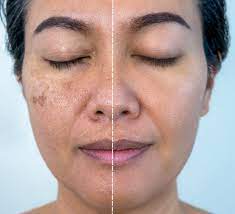Melasma, a common skin condition characterized by the appearance of brown or gray patches on the face, can be a source of frustration and self-consciousness for many individuals. It predominantly affects women, especially those with darker skin tones, and is often triggered by hormonal changes, sun exposure, or certain medications. While melasma is a benign condition, its impact on self-esteem and confidence should not be underestimated. Thankfully, There are several effective melasma treatment in Abu Dhabi options available to address this condition and help individuals achieve a more even skin tone.
1. Sun Protection: Shielding the skin from harmful UV rays is crucial in managing melasma. Sunscreen with a high sun protection factor (SPF) should be applied daily, even on cloudy days. Look for broad-spectrum sunscreens that protect against both UVA and UVB rays. Additionally, wearing a wide-brimmed hat and using a parasol or umbrella can provide extra protection against the sun’s damaging effects.
2. Topical Treatments: Several topical treatments can help improve melasma by reducing the appearance of dark patches. These may include:
a. Hydroquinone: Widely considered the gold standard in melasma treatment, hydroquinone works by inhibiting the production of melanin, the pigment responsible for skin color. It is available in various strengths and should be used under the guidance of a dermatologist.
b. Retinoids: Derived from vitamin A, retinoids promote skin cell turnover and can help fade melasma. However, they should be used with caution, as they can cause skin sensitivity and irritation. It is advisable to start with a low concentration and gradually increase usage.
c. Kojic Acid: Derived from certain fungi, kojic acid is known for its skin-lightening properties. It inhibits tyrosinase, an enzyme involved in melanin production. Kojic acid is often combined with other ingredients, such as hydroquinone or retinoids, to enhance its effectiveness.
d. Azelaic Acid: This naturally occurring acid helps to normalize melanocyte activity and reduce pigmentation. It is well-tolerated by most skin types and can be used alongside other topical treatments.
e. Vitamin C: As a potent antioxidant, vitamin C can help brighten the skin and reduce the appearance of melasma. Look for stable forms of vitamin C, such as L-ascorbic acid, in serums or creams.
3. Chemical Peels: Chemical peels involve applying a solution containing exfoliating agents to the skin, which helps remove the outer layers and reveal a fresh, more even complexion. Peels containing alpha-hydroxy acids (AHAs), such as glycolic or lactic acid, can be effective in managing melasma. However, these treatments should be performed by a trained professional to minimize the risk of complications.
4. Laser Therapy: In some cases, laser therapy may be recommended to treat melasma. Various laser and light-based treatments can target the excess melanin in the skin and break it down, leading to a reduction in pigmentation. Multiple sessions may be required, and it is essential to choose an experienced dermatologist or laser specialist for this treatment.
5. Lifestyle Factors: Making certain lifestyle changes can also contribute to the management of melasma. These include:
a. Avoiding excessive sun exposure, especially during peak hours.
b. Using gentle skincare products and avoiding harsh cleansers or scrubs that may irritate the skin.
c. Managing stress levels, as stress can potentially worsen melasma.
d. Maintaining a healthy diet rich in antioxidants and essential nutrients that support skin health.
e. Ensuring adequate hydration by drinking plentyof water throughout the day.
While there is no one-size-fits-all approach to treating melasma, a combination of these nourishing solutions can help revive the complexion and reduce the appearance of dark patches. It is important to remember that results may vary, and consistency is key when it comes to skincare. Consulting with a dermatologist or skincare professional is highly recommended to determine the most suitable treatment plan for individual needs. With time, patience, and proper care, melasma can be effectively managed, allowing individuals to regain their confidence and enjoy a revitalized complexion.
